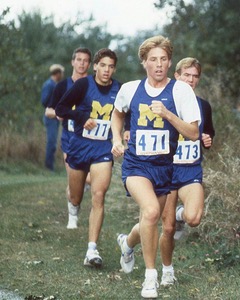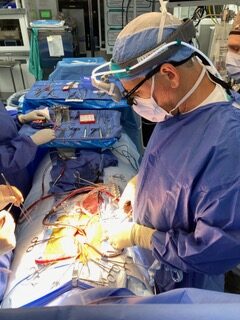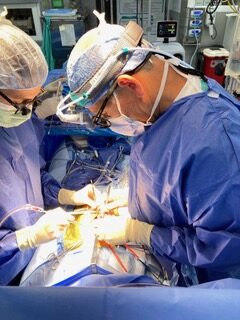EDITOR’S NOTE: The Mahomet Daily will feature each of the four new selections for the Mahomet Education Foundation Hall of Fame in upcoming days. Today’s focus, Karl Welke.
By FRED KRONER
Some of us – many of us? – have a tendency to look upon athletic events as life or death scenarios.
Not Karl Welke.
The former Mahomet-Seymour cross-country and track and field standout – who subsequently ran four years for the University of Michigan – knows the difference.
He faces potential life or death situations nearly every day that he works.
Welke is a pediatric cardiac surgeon – who has performed heart transplants – and routinely works on patients who were only born days earlier.
The sporting world is a diversion to real life, not a seriously equal counterpart.
“My specialty deals with life and death,” said Welke, a 1985 M-S graduate. “We like it when things are routine and mundane, but even in situations that might seem stressful, I don’t see it that way.
“I’m a problem-solver. I think, ‘What do I need to do to fix it?’”
For his work in the field of medicine as well as for his athletic prowess nearly 40 years ago, Welke was selected as one of four inductees for the Mahomet-Seymour Schools Foundation Hall of Fame. The ceremony will take place on Friday, September 22 prior to that night’s 7 o’clock high school football game against Taylorville.
Welke will be joined by former state champions Dirk Handlin (track and field, Class of 1989), James Heinold (wrestling, also Class of 1989) and the late Judy Swiger, who helped build the M-S drama program into one of the state’s best during her 34-year tenure as a teacher.
Referring to Welke, whom he worked with as part of the M-S weight training program, former M-S coach and teacher Jim Risley said succinctly, “There’s good. There’s great and there’s special.”
Welke is in his sixth year working in Charlotte, N.C., at Atrium Health Levine Children’s Hospital, which averages around 450 pediatric cardiac surgeries annually and between 10 and 20 heart transplants each year.
“I operate primarily on children, but have had 60-year-olds who were born with a heart defect and now need another surgery,” Welke said. “About one-third of our patients are under a month of age and many are only a week old.
“Our entire team is trained to do it. All we do is operate on patients with pediatric heart disease.”
In an era of medical confidentiality, Welke was surprised by a comment he heard from his daughter, Annika, about six years ago when he came home from work one day.
“She said, ‘I heard the operation went well,’” related Welke, who was curious how she even knew about the young girl he had worked on that day in the operating room.
“It turned out my patient’s mother was a teacher at my daughter’s school and when they announced that the surgery went well, all of the kids stood up and cheered.”
Welke has had many, many more stories of success than “operations that have not gone the way I wanted,” he said.
When he was working in Peoria (from 2014-17), he had one of those positive moments where it’s clear that there can be connections anywhere.
While at M-S, Welke played the trombone for two years, which was also the instrument of choice for band director Dick Watkins.
In 2017, he was scheduled to perform open-heart surgery on a child about 2 years old, who had been born with a heart defect.
“There is supposed to be a wall between the two sides (of the heart),” Welke said. “The wall didn’t fully develop, and one valve didn’t completely develop.
“It was a moderate-level operation (in terms of complexity). You repair the hole and repair the valve.”
The surgery was a success and Welke’s conclusion was, “she’s someone I would expect to have a normal life expectancy.”
The projected outcome would have been much different had the surgery not been performed.
“Without the operation, there would have been an increase in heart failure, and she would have died young,” he said.
Welke met with the family – and the extended family – after the procedure which took about 5 hours. That’s when he learned the grandparents were Dick and Janet Watkins.
“How many times does the surgeon who just did open-heart surgery on your little granddaughter come out with arms open for a welcoming hug?” Janet Watkins wondered. “How many times does the surgeon doing open-heart surgery on your granddaughter just happen to be a former student from the high school where you had taught?
“Wow!”
The Watkins’ daughter was younger than Welke, and did not know him personally, but her parents were delighted that Welke was part of the surgical team that day.
“We were just so thrilled that our granddaughter’s life was in his hands, and she is now flourishing, six years later,” Janet Watkins said.
She was impressed with Welke and how he conducted the post-surgery report to the family.
“He was very calm and reassuring – which one needs with a baby with holes in her heart and other issues – and personable with us, taking plenty of time to chat,” Janet Watkins said. “Often, surgeons are in a hurry to move onto the next thing.”
In retrospect, Welke said it was not all that surprising for him to be part of the team that operated on the Watkins’ granddaughter. There are only around 130 hospitals nationwide with the ability and facilities to perform the operation that was needed.
There’s two in Chicago, one in Peoria (OSF) while the other closest ones for residents in Central Illinois would be hospitals in Indianapolis, Iowa City or St. Louis.
***
As a pediatric cardiac surgeon, Welke operates on a variety of conditions, some with more serious risks than others.
However, statistical studies have shown that on average, “patients have a 97 percent chance of surviving surgery.”
That one metric is not the only one which concerns Welke.
“The next measure is quality of life,” he said. “That’s what matters to families.
“Just because a child is born with a heart condition does not mean they should be limited. My goal is to provide children the chance for a long and fulfilling life. To help them along that journey is very satisfying.”



In addition to his time in surgery, Welke also enjoys the research component.
His research focuses on measuring and improving the quality of care for patients born with congenital heart defects.
“In the operating room, it’s one person at a time,” he said. “When I write an academic paper, it can impact the lives of many patients across the world.”
One study of Welke’s focused on pediatric heart patients, who subsequently needed an additional follow-up operation years later as an adult.
“We showed you get better results,” if they are still treated by a pediatric heart surgeon throughout their life, he added.
Some of his other work has examined relationships between the characteristics and experience of hospitals and how patients do after surgery. This research has been used by states and countries to develop health policy, and design heath care networks for their residents.
Though Welke always hopes for the best possible outcome, the reality is that there are no guarantees.
“We deal with death as surgeons,” he said. “We can’t fix everything.
“My specialty has a higher mortality rate than any other specialty. Patients die, and that impacts what we do next.
“I don’t put it out of my mind. I analyze what I do in great detail. If something doesn’t go well, I look at it and see how it can be improved.”
The son of Robert and Sue Welke, Karl Welke was exposed to the medical profession at a young age. His father was a Carle urologist for 43 years.
When Karl Welke enrolled at the University of Michigan, he hadn’t yet settled on a pre-med curriculum.
“I went to engineering school and took engineering science,” he said.
From there, he gravitated into medicine. While in medical school at the University of Illinois, he found his passion.
“Surgery appeals to me,” he said. “I like the hands-on part, the decision-making and that it’s time-sensitive. You can fix problems.”
During his time at Dartmouth, where he underwent general surgical training and earned his master’s degree in 2001, Welke narrowed his focus.
“I was exposed to a lot of surgical specialties,” he said. “Cardiac surgery appealed to me, and operating on the heart is one of the more technically complex areas.
“I like working with kids. I’ve changed patients’ lives. To think I can do something and have that longevity is very appealing.”
Heart transplants have only taken place after Welke was born. He was 37 days old when the first one was performed in December, 1967, in Cape Town, South Africa. That patient lived for 18 days. Now, the life expectancy has grown to decades.
Welke has had numerous role models and mentors, starting with his parents.
“My parents were supportive and modeled parenting,” Welke said. “They were not overly intrusive, and allowed us to make mistakes.”
His father, in particular, had interests beyond his profession.
“He was knowledgeable in a lot of areas,” Karl Welke said. “My world view expanded growing up with my parents.”
Teachers played a key role in his life, too, beginning with his time at Seymour Grade School, “and my fifth-grade teacher, Jean Cogswell,” he said.
At M-S, junior high science teacher Robert (Moose) Handlin was “very good,” said Welke, who still gets occasional reminders about that time.
“My mother has my lab notebook,” he said.
In high school, he especially appreciated mathematics instructors Jerry Holman and Geralyn Koeberlein.
“When I got to Ann Arbor and took calculus, my first year was what I had learned in Mahomet,” Welke said. “We were getting as good of an education as you could anywhere.”
As Welke looks through the list of names for those already enshrined in the M-S Schools Foundation Hall of Fame, he sees people who impacted his life, from Handlin to others whom he knew from school.
“I was surrounded by people who modeled excellence,” Welke said. “Ed Grogg was my Little League baseball coach. I rode the bus with Brian Herriott and knew Cully Welter and Rob Porter (all Hall-of-Famers).”
As for joining that illustrious group in the Hall of Fame, Welke said it was an unexpected honor.
“I was certainly surprised,” he said. “I never thought I would be considered for something like that.
“When you think about it, it’s more than an individual honor. My ability to do what I do is a reflection on the Mahomet-Seymour community and the people who got me to that point.”
***
When he graduated from M-S, Welke owned the fourth-fastest 3,200-meter time in school history, clocking a 10:00.1 time. Thirty eight years later, he is still among the school’s top 20, holding a 19th-place tie in the event.
Welke started running as a seventh-grader on the track and field team. At that time, there was no cross-country program for the seventh- and eighth-graders in the M-S district.
After running for that one spring, Welke decided to concentrate on basketball.
“I didn’t have a lot of success (running) and didn’t connect with it,” he said. “And, I really enjoyed basketball.”
His younger sister, Karen (Class of 1987), was making great strides as a runner and eventually won an IHSA state championship in the 1,600 meters as a senior.
When Karl Welke was about to start his sophomore year, he returned to distance running and went out for cross-country for the first time.
“My good friend, Neil Mathis, thought I should try cross-country,” Welke said. “The workouts were at the Lake of the Woods (under head coach John King) and our warmup was to run from the school to the Lake.”
It took time for Welke to get adjusted to the distance.
“I had to stop a few times (on the way to practice),” he said.
When the season’s first meet took place, at the Chrisman Cowchip Classic, Welke was entered in the race for each school’s No. 7 runners because a teammate was unavailable.
“I got a trophy, and was varsity from then on,” he said.
The difference between his first venture into running and his second was like night and day.
“If you do something well, you want to do it again,” Welke said. “I had friends who were running, and Coach King was nice.
“My sports before (primarily baseball, basketball and hockey) were skill sports. Distance running is a different mindset. It’s a long-term endeavor. You don’t get quick satisfaction.”
In some respects, running helped Welke prepare for his future career as a surgeon.
“My part of medicine is very much a team sport,” he said. “I could not do what I do without an outstanding team.
“You learn to work with others. The enjoyment you get from team sports is there.”
Welke wound up earning three varsity letters each in cross-country and track and field at M-S as well as two cross-country letters and three in track at Michigan. While at Michigan, he also earned academic All-Conference recognition in each sport.
Mathis’ influence was instrumental while Welke was competing for the Bulldogs.
“We ran together a lot, in practice and on our own,” he said. “We ran in the morning, in the summer and during the winter.”
When not running, Welke said he wasn’t sitting idly.
“Riz (Jim Risley) had us lifting every summer and that certainly made us better,” Welke said.
At Michigan, Welke came under the tutelage of the famed coach Ron Warhurst.
A collegiate highlight for Welke was getting the chance to compete in his hometown.
“My sister ran on the women’s team, and the 1988 NCAA Regional was held in Mahomet (at what is now Buffalo Trace),” Welke said. “It was muddy and we sprayed silicon on our spikes to keep them from caking up.
“Our team and the women’s team were each second and qualified for nationals. That was a nice memory to have.”
The women’s team, with Karen Welke the No. 1 runner, placed seventh at nationasl. The Michigan men’s team was 17th.
As a college senior, Karl Welke had another chance to compete locally. The University of Illinois was the host for the Big Ten track and field meet.
“College athletics were a big part of our life growing up,” Karl Welke said. “We’d go to a lot of UI events.”
Welke met his future wife, Lori, when he was a cardiac surgery resident at the University of Iowa Hospitals and Clinics. They married in 2004 and have five children: Annika (high school sophomore), Ryker (eighth-grader), Aksel (fourth-grader), Maverick (second-grader) and Arbor (kindergartner).
Remember the comment about sports not being a life or death scenario?
Even now, there are moments where Karl Welke might not agree with that sentiment.
His youngest daughter is now playing in a coach-pitch baseball league.
“She hit a line drive that almost took my head off,” Karl Welke said.



